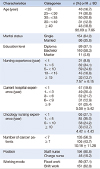Abstract
Purpose
The purpose of this study was to investigate whether the effects of emotional intelligence and working environment on nursing performance of nurses caring for cancer patients in small and medium hospitals were mediated by communication competence.
Methods
The data was collected between Aug. 1 and Aug. 30, 2018 from 240 nurses caring for cancer patients from 11 small and medium hospitals in B city. Variables included in this study were the Wong and Law Emotional Intelligence Scale (WLEIS), the Practice Environment Scale of Nursing Work Index (PES-NWI), the Global Interpersonal Communication Competence (GICC), and nursing performance. The collected data were analyzed by t-tests, ANOVA and Scheffe's test, Pearson's correlation coefficients, and 3 step multiple regression using SPSS/WIN 24.0 and the Sobel test.
Figures and Tables
Table 2
Scores of Emotional Intelligence, Nursing Working Environment, Communication Competence, Nursing Perfor-mance (N=240)

Table 3
Correlation among Emotional Intelligence, Nursing Working Environment, Communication Competence, Nursing Performance (N=240)

References
1. National Cancer Information Center (KR). 2016 Cancer statistics [Internet]. Accessed November 15, 2019. Available from: http://www.cancer.go.kr/.
2. Kim MJ, Park JA, Shin SJ. Pain and pain management in hospitalized cancer patients. J Korean Acad Fundam Nurs. 2008; 15:161–170.
3. Health Insurance Review and Assessment Service (KR). Healthcare bigdata hub [Internet]. Accessed October 10, 2017. Available from: http://opendata.hira.or.kr/op/opc/olapMfrnIntrsIlnsInfo.do.
4. Mick J. Factors affecting the evolution of oncology nursing care. Clin J Oncol Nurs. 2008; 12:307–313.

5. Kwon JO, Kim EY. Impact of unit-level nurse practice environment on nurse turnover intention in the small and medium sized hospitals. J Korean Acad Nurs Adm. 2012; 18:414–423.

6. Ko YK, Lee TW, Lim JY. Development of a performance measurement scale for hospital nurses. J Korean Acad Nurs. 2007; 37:286–294.

7. Kim YJ. The effects of emotional intelligence and communication competency on nursing performance of outpatient nurses [master's thesis]. Seoul: Yonsei Univ.;2016.
8. Codier E, Kamikawa C, Kooker BM. The impact of emotional intelligence development on nurse managers. Nurs Adm Q. 2011; 35:270–276.

9. Klopper HC, Coetzee SK, Pretorius R, Bester P. Practice environment, job satisfaction and burnout of critical care nurses in South Africa. J Nurs Manag. 2012; 20:685–695.

10. Buerhaus PI, Donelan K, Ulrich BT, Norman L, Dittus R. Is the shortage of hospital registered nurses getting better or worse? Findings from two recent national surveys of RNs. Nurs Econ. 2005; 23:61–71.
11. Kim YH, Choi YS, Jun HY, Kim MJ. Effects of SBAR program on communication clarity, clinical competence and self-efficacy for nurses in cancer hospitals. Korean J Rehabil Nurs. 2016; 19:20–29.

12. Olsson M, Larsson LG, Flensner G, Bäck-Pettersson S. The impact of concordant communication in outpatient care planning - nurses' perspective. J Nurs Manag. 2012; 20:748–757.

13. Lee HS, Kim JK. Relationship among communication competence, communication types, and organizational commitment in hospital nurses. J Korean Acad Nurs Adm. 2010; 16:488–496.

14. Kim SJ. The effect of nurse's emotional intelligence and communication competency on nursing performance [master's thesis]. Suwon: Ajou Univ.;2017.
15. Emold C, Schneider N, Meller I, Yagil Y. Communication skills, working environment and burnout among oncology nurses. Eur J Oncol Nurs. 2011; 15:358–363.

16. Lee EJ, Lee SI. The mediating effect of ego-resilience on the relationship between emotional intelligence and nursing performance among clinical nurses. Health Commun. 2018; 13:19–27.
17. Kim SH, Park SK, Lee MH. Effect of a nursing practice environment on nursing job performance and organizational commitment: focused on the mediating effects of job embeddedness. J Korean Acad Nurs Adm. 2019; 25:208–219.

18. Wong CS, Law KS. The effect of leader and follower emotional intelligence on performance and attitude: an exploratory study. Leadersh Q. 2002; 13:243–274.

19. Choi SB, Yoon YR. The impacts of emotional intelligence, job satisfaction and self-efficacy on the organizational citizenship behavior: the case of nurse in university hospital. J Hum Resour Manag Res. 2012; 19:73–93.
20. Lake ET. Development of the practice environment scale of the nursing work index. Res Nurs Health. 2002; 25:176–188.

21. Cho EH, Choi MN, Kim EY, Yoo IY, Lee NJ. Construct validity and reliability of the Korean version of the practice environment scale of nursing work index for Korean nurses. J Korean Acad Nurs. 2011; 41:325–332.

22. Hur GH. Construction and validation of a global interpersonal communication competence scale. Korean J Journal Commun Stud. 2003; 12:380–408.
23. Van de Ven AH, Ferry DL. Measuring and assessing organizations. New York, NY: John Wiley & Sons;1980.
24. Baron RM, Kenny DA. The moderator-mediator variable distinction in social psychological research: conceptual, strategic, and statistical considerations. J Pers Soc Psychol. 1986; 51:1173–1182.

25. Park SH, Park MJ. The effects of emotional intelligence, nursing work environment on nursing work performance in clinical nurses. J Digit Converg. 2018; 16:175–184.
26. Kim J, Lee TW. The influence of nursing practice environment, compassion fatigue and compassion satisfaction on burnout among clinical nurses. J Korean Clin Nurs Res. 2016; 22:109–117.
27. Kim MG. The impact of nurse staffing level on in-hospital death and infection in cancer patients who received surgery. J Korea Acad Ind Coop Soc. 2017; 18:408–417.
28. Youn KI. The effects of nurse staffing and skill mix on in-hospital mortality in the hospitals with different characteristics. J Health Inform Stat. 2017; 42:27–35.





 PDF
PDF ePub
ePub Citation
Citation Print
Print





 XML Download
XML Download